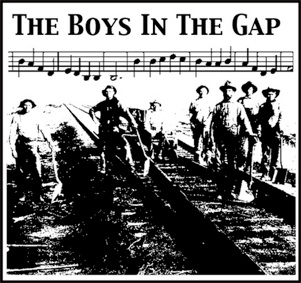Clann Mhór


In the 1850s, several thousand Irish workers arrived in Virginia to build the railway and blast the tunnels at Rockfish Gap in the mountains between Charlottesville and Staunton. Scores of Irish boys barely in their teen years were part of this large work force, as were more than a hundred slaves. The work itself was always exhausting and frequently dangerous.
There is an old traditional reel called "The Boy in the Gap" that most Irish musicians play. The title refers to anyone who diligently guards a strategic place or bearna baoil, an Irish phrase meaning the gap of danger.
This song attempts to imitate the diction and thought of Irish songs of the 1800s and early 1900s. It is set to the air of "Skibbereen," a well-known song which depicts the social conditions in Ireland (particularly County Cork) in the years of the Great Hunger. "Skibbereen" has been recorded many times, and there are excellent versions by Mick Moloney, The Wolfe Tones, Don Stiffe, Sinead O'Connor, and Ron Kavana. To hear it sung by Ronnie Drew of the ballad group The Dubliners, click HERE.
A further background note: In Ireland the Moyry Pass is known as " the Gap of the North." It is located between County Louth and County Armagh. As two historians inform us, "The Moyry Pass has always been an important route through the mountains in the north, and it still is, with the main north-south railway line running through it. ...The Moyry Pass remained under the control of the Irish until the end of the seventeenth century." (Noreen Cunningham and Pat McGinn, The Gap of the North: The Archaeology and Folklore of Armagh, Down, Louth, and Monaghan. Dublin: O'Brien Press, 2001, pg. 77.)
THE BOYS IN THE GAP
I'm Con Lucy from Cork, and I'll sing today of those who fled with me
From our valleys green that were taken away by the English who paid no fee.
When the potatoes failed, we lamented the day, and we begged on bended knee.
But evicted and worse, we sailed away from Lough Leane and the River Lee.
We left behind our kin and friends and the lands we'd held so dear;
We'd no longer see Blackwaterside or the Corrib stream so clear.
Our heads hung low, exiles we were, we all did feel the fear
Across the western ocean to go, three thousand miles from here.
Some went to cities like New York, others to Maryland.
We'd heard the tales of good weekly pay, and we hoped for a friendly hand.
We found ourselves with shovel and pick in canals with muck and sand ---
To the railway in Virginia, we came with family band.
For ten long years we worked and died on the Blue Ridge Mountain peak,
Two thousand micks and enslaved men, too, barely lived from week to week.
But we cleared the land and the hard rock, too, of black powder we did reek,
Our families never thought that this new life could be so bleak.
We'll tell these names of Irish folk: oppression they could not bear.
From Clare came Bridget Cannody, and Fallons from Longford so fair.
Croghans, Barrys, and Sullivans, to emigrate did dare;
And James and Mary Ryan left sweet Glasheen's lovely air.
Twas a hard and dreary life, the truth to you we'll tell.
Cholera killed Dan Harrington; Mary Barry also fell;
For the Dillon child and Mrs. Holleran, we rang the cold death bell,
And dozens more, like Jim Hagerty, did hear the dread death-knell.
We'll not see the likes of Joe Marrow again, shot dead by a Brooksville thug;
And John Noonan was shot, and Patrick Hayes, too: bullets into them dug.
We knew the dead slaves Jerry and Tom, but where were their graves dug ?
These forgotten railway humans now, the kindly earth does hug.
Lyrics by Kevin Donleavy
Click HERE for a video version of Kevin singing his song.